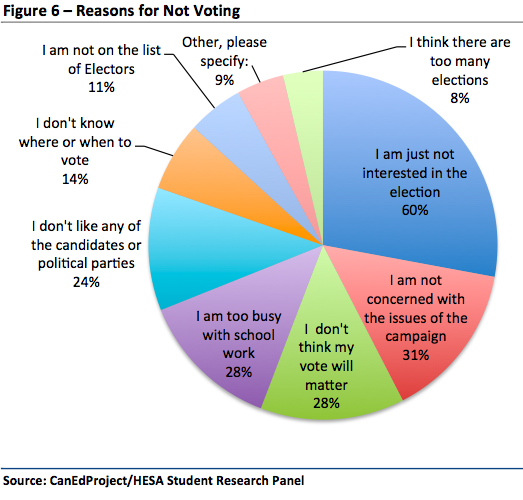
Students want something to vote for - where is it?
I've already raised the issue of the inability of Canada's political parties to resonate with people's concerns. Now, the Canadian Education Project has released a report about the voting intentions of students across the country. Check out the report itself (PDF) for all the nitty-gritty, but what I find most interesting is the last section, where they break down the respondents' reasons for not voting (see the chart above).
The chart doesn't add up to 100% because respondents could choose more than one answer. It's clear that apathy does take a big chunk of the pie, but I'm not sure it's the most important obstacle. It's impossible to be certain without more detailed data, but I'm convinced that the "I'm just not interested" slice is a result of some of the other, more fundamental reasons for not voting.
Take a look at some of the other answers: 24% of non-voters don't like any of the candidates. 31% don't see any relevant issues being discussed in the campaign. And even if they like the idea of voting, 28% don't think their ballot will matter. All of these issues can fuel disinterest in the election. The fact is that many students feel they are not being represented by the current political options out there.
The solution to this is to vote with your heart and allow fringe parties to flourish. Some, like the Pirate Party of Canada, have already risen up to address an issue that the traditional parties have largely ignored. I firmly believe that this trend will be a long-lasting benefit to our democracy, but it requires a couple things to survive. First, an overhaul of our voting system that makes representation in the house of commons reflect the popular vote. And second, a culture of cooperation on Parliament Hill where it isn't taboo to make short-term alliances across party lines.
The puzzling question for me in all of this is how to go about making such a seismic change in Canadian politics. Do a flurry of new fringe parties need to crop up in order to force a change in political culture? Or do we need to reform the voting system first, sending the message that a vote for a fringe party isn't a wasted one?
Your guess is as good as mine.
Sam Nabi